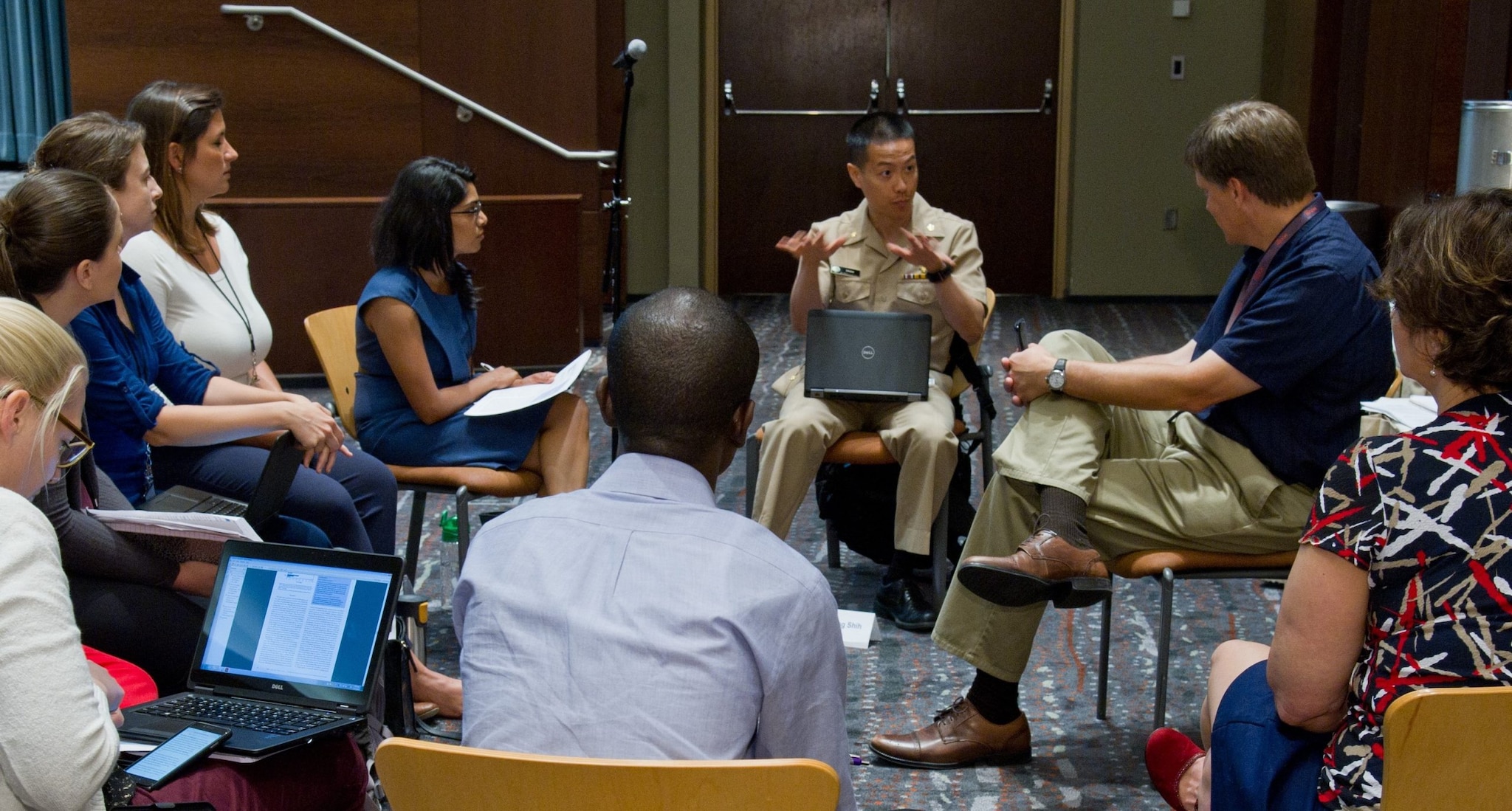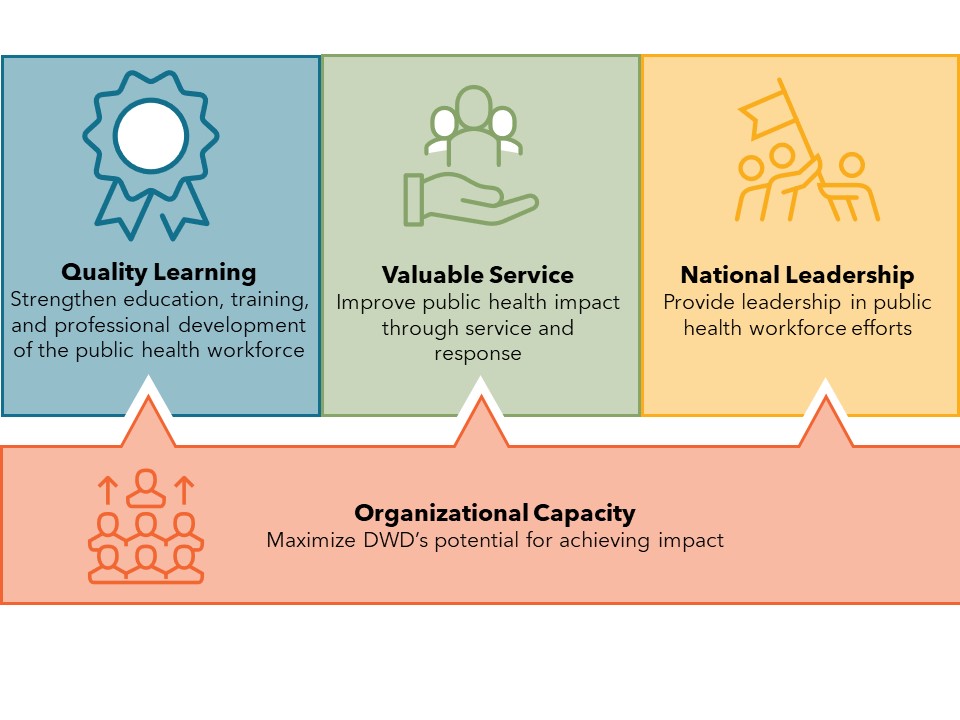At a glance
The Division of Workforce Development (DWD) provides leadership in public health workforce development. This involves leading advancements in training, developing, and retaining the nation’s public health workforce. In this role, we chart a path forward at all levels of the public health system.

What we do
We create pathways to careers in public health.
Our programs provide quality learning experiences across the workforce continuum. Programs range from opportunities for middle and high school STEM teachers to service-learning fellowships.
We upskill the current public health workforce.
We offer and promote quality training opportunities. We connect partners and health professionals with accredited, competency-based training from CDC, other federal agencies, and federally funded partners.
We build evidence of what works and promote use of best practices.
We support efforts to define and build evidence to address public health workforce needs. The Public Health Workforce Research Center is an example of how we build evidence.
We strategically partner to address workforce priorities.
We collaborate with national, state, tribal, local, and territorial organizations to advance public health.
Goals

Goal 1: Quality Learning
Strengthen education, training, and professional development of the public health workforce.
- Strengthen the skills of the current public health workforce through quality, accredited, competency-based training
- Promote career pathways in governmental public health through workforce development programs
Goal 2: Valuable Service
Improve public health impact through service and response.
- Address needs of CDC programs, state, Tribal, local, and territorial health departments, public health labs, and partners through fellows’ service-learning assignments
- Partner with CDC’s centers, institute, and offices in response to urgent domestic and international public health needs through short-term technical assistance
Goal 3: National Leadership
Provide leadership in public health workforce efforts.
- Facilitate the use of standards and best practices for public health training and workforce development programs
- Define public health workforce needs and build evidence to address identified needs
- Strategically address workforce priorities with partners
- Help tell the public health workforce story, therein expanding reach and awareness of challenges, opportunities, and outcomes
Goal 4: Organizational Capacity
Maximize DWDs potential for achieving impact.
- Prioritize core work and ensure alignment of staff and resources
- Strengthen the division’s foundational capabilities and cross-cutting servicesA
- Support professional development for DWD staff
Our impact
DWD's work attracts and maintains a steady flow of fellows ready to launch their public health careers. They provide critical capacity, support, and technical assistance to state, tribal, local, and territorial health departments and public health partners.
We accredit, promote, and deliver quality learning opportunities for health professionals to improve health. These opportunities offer free CE credits—saving public health professionals millions of dollars in fees.
By the Numbers
- More than 13,030A participants trained in DWD's fellowship and student programs since the first EIS officers in 1951.
- 891 participants trained in DWD’s fellowship, training-in-place, and student programs in fiscal year 2024B alone.
- DWD fellows supported 137 responses to technical assistanceC requests from state, local, and national public health authorities in fiscal year 2024B alone.
- More than 6,320A responses to technical assistanceC requests from state, local, and national public health authorities since 1946.
- More than 456,000 unique learners completed over 1.3 million courses in CDC TRAIND in fiscal year 2024B.
- More than 205,000 unique health professionals earned free continuing education (CE) in fiscal year 2024B.
Our work
The Division of Workforce Development (DWD) offers services and support to state, local, tribal, and territorial public health departments and partners.
Staffing Support through Fellow Assignments
State, tribal, local, and territorial health departments and public health partners can apply to host a fellow from several of our programs. Our fellows lend a variety of skills to increase workforce capacity. Working alongside mentors and subject matter experts, fellows and interns gain experience for future public health careers. Find out how to become a host site for CDC fellowships.
Technical Assistance and Deployments
Public health partners can request short-term technical assistance from our fellows. During their deployment, fellows work closely with the jurisdiction's public health authorities and appropriate subject matter experts at CDC. This opportunity provides a mutual benefit for the fellows and the agency needing assistance.
Officials with authority for public health can request technical assistance through several mechanisms:
Epi-Aid
Allows rapid, short-term (1–3 weeks), generally onsite, technical assistance by Epidemic Intelligence Service officers. https://www.cdc.gov/eis/php/request-services
Lab-Aid
Allows rapid, short-term (1-3 weeks) support to public health labs for laboratory testing or operational needs by Laboratory Leadership Service fellows. Request a Lab-Aid.
Info-Aid
Short-term technical assistance to address an urgent public health need for applied information science, through the Public Health Informatics Fellowship Program. Request an Info-Aid.
Our fellows also participate in emergency response or other urgent public health events. They can deploy to local communities or to CDC's Emergency Operations Center.
Support for Training Development and Accreditation
DWD provides resources to help public health partners develop quality trainings that improve staff competence and capacity. Training programs that meet CDC quality training standards can better prepare health professionals to meet today's challenges.
- Training development resources aid in designing and evaluating online and classroom trainings.
- Continuing education accreditation services are available for programs and CDC-funded partners.
Resources
Have a question about fellowships, training services, or other public health workforce development activities? Ask us.
- As of September 30, 2024
- October 2023 through September 2024
- Technical assistance includes Epi-Aids, Info-Aids, Lab-Aids. PHAP Associate Deployments (e.g., CASPER), Small Evaluation Projects, and PMF Rotations
- CDC TRAIN is CDC's external learning management system—an affiliate of the Public Health Foundation's TRAIN Learning Network—available to learners across the public health community
- Division of Workforce Development
- CDC TRAIN is CDC's external learning management system—an affiliate of the Public Health Foundation's TRAIN Learning Network—available to learners across the public health community.
